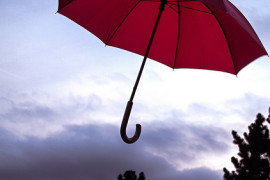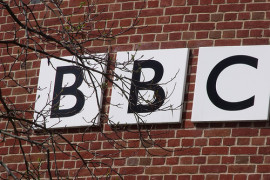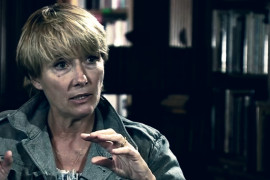An interview on Newsnight of the actress and Labour-supporter Emma Thompson has taken the BBC’s handling of climate alarmism to new depths of shoddy and biased journalism.
Under the editorship of ex-Guardian man Ian Katz, this type of celebrity interview – in which the subject is given virtual carte blanche to put across highly questionable leftist views – has become a regular feature. Here, for example, it was Russell Brand.
For years, the Corporation’s approach to climate reporting has been deliberately and systematically skewed against those who are sceptical about alarmism.
The grossly biased stance was decided by the BBC Trustees and became official editorial policy back in 2011. Since then, the output in all programmes, from news and current affairs to drama, has been hinged to a massive extent upon the mantra that unless we massively curb carbon dioxide output we are doomed.
The policy is so absolute that one appearance by a ‘sceptic’, such as that by the Daily Mail’s Quentin Letts, when he dared to question elements of the prevailing orthodoxy, is met with an internal inquiry and fits of apoplexy by those – such as the BBC’s former ‘environment’ correspondent , Richard Black, now a prominent eco-campaigner- who claim to know with certainty that we are all going to fry.
Meanwhile, as another indicator of how deeply alarmism is engrained in BBC reporting, the Corporation’s overseas aid charity arm, Media Action, is engaged in extensive operations throughout the world to spread climate alarm in every way it can, while at the same time encouraging developing countries to resent Britain and the West generally for causing the alleged problem.
The latest example of this BBC worship at the altar of climate alarmism was the appearance last Wednesday by Ms Thompson.
Thompson, it should first be said, has become one of the most prominent media supporters of the law-breaking ‘charity’ Greenpeace, as is evidenced here in the pages of the Guardian. She is also a declared life-long member of the Labour party, supports Action Aid, a development charity that is as strident as Greenpeace in its climate alarmism, and is also strongly pro-Palestinian (and thus anti-Israel).
The peg for her appearance was an event that was scarcely reported elsewhere, the decision by Greenpeace to place a giant polar bear outside the HQ of Shell in London in their bid to try prevent the company from drilling for oil in the Arctic. She did not deign to come live into the Newsnight studios, and rather, presenter Emily Maitlis treated her throughout the recorded exchange as if she was a highly respected dignitary with immense status.
The full transcript is below.
The first question was if Thompson thought she could negotiate with the ‘oil giant’. The essence of Thompson’s answer was that Shell were liars, there was no point in negotiating and ‘if you look at the science’ their drilling for oil would lead to a 4C rise in temperature by 2030.
Maitlis then asked whether there was a path for Thompson ‘to the president of the US’. She replied that she could try, but it would be pointless because governments were in the pockets of big oil.
Next was whether it would help the Greenpeace Arctic campaign if she got arrested. Thompson agreed that arrests were useful publicity for Greenpeace. But she was sure it wouldn’t happen because the legions of Shell PR people ‘in their big buildings’ would bust a gut to prevent it.
Ms Thompson didn’t say it, but she clearly believed they had battalions in the wings ready to do anything to avoid the ruinous impact of a ‘Thompson arrest’ pic.
Finally (in questions about climate), Ms Maitlis wondered how she could choose to demonstrate for Greenpeace when the refugee ‘crisis’ was so pressing. Thompson said the two topics were profoundly connected. She asserted that if climate change was allowed to ‘go on as it’s going’, the current refugee crisis would soon look like a tea party because ‘there are going to be entire swathes of the Earth that would become uninhabitable, and where are those people going to go? We are looking at a human disaster of proportions we can’t imagine’.
Even by the BBC standards this was bad journalism:
In summary, the BBC’s self-declared flagship television news and current affairs programme broadcast inaccurate preposterous propaganda from a woman who is a self-declared activist. There was no effort to challenge her views even though they were obviously extreme.
Of course, the BBC has a duty to give voice to all parts of the sides of public debate. The reality in the climate alarmism stakes, however, is that those in favour are given free rein – to the point of absurdity – while those who think differently are simply not invited to take part.
A ruling last year by the BBC complaints department said that Lord Lawson should not be allowed to discuss climate change on an equal footing to ‘experts’ who believed in alarmism because he himself was not a climate scientist. On which grounds was Emma Thompson, an English graduate from Cambridge, allowed on Newsnight to spout utter nonsense?
Because her views chime with those of Ian Katz?
Transcript:
EMILY MAITLIS: Well, one voice unambiguous in her support of this country bringing in more refugees is the actress, Emma Thompson, whose own adopted son was a refugee from Rwanda. She was about 4 o’clock this morning helping bring life to a giant polar bear, Aurora, who she and some 60 other Greenpeace campaigners took to the Shall Centre on London’s South bank to protest against Arctic drilling. I caught up with her earlier and asked whether she believed she could negotiate with the oil giant.
EMMA THOMPSON: No, because we’ve been negotiating with Shell for years, and there’s been so much obfuscation and so many lies actually, and so much green-wash, they’ve absolutely put lip-service to ‘Yes, yes, we’re interested in renewables, yes, yes, yes’, but they’ve continued without cessation to extract, and they’ve continued their plans to drill in the Arctic. They have plans to drill until 2030, and if they take out of the earth all the oil they wanted to take out, you look at the science, our temperature will rise 4°C by 2030, and that’s not sustainable.
EM: Is there a path for you straight to the president of the US?
ET: Well, I could try ringing him . . . I suppose. But I don’t think that that would help, I think that successive governments including his have been too much in the pockets of the big oil companies. I think it’s very difficult for governments to break away from that.
EM: Would be useful for you, on a matter of the Arctic for example, to get yourself arrested? Does that sound useful?
ET: It depends I suppose, I mean, today, I would have been, I suppose, a good news story Greenpeace, and arrests are useful to them. I could just hear the sort of distant sound of all the PR people in the shell offices in the big buildings, going ‘Don’t arrest her, do not arrest the big mouth, please don’t (words unclear) don’t do that.’ So they didn’t.
EM: How do you choose? I mean, there will be people watching this saying there are currently thousands of people drowning in the Mediterranean, what odds timing to go and talk about Arctic and oil, and the environment?
ET: Hmm.
EM: As opposed to, you know, what Britain has to do about the refugee crisis.
ET: No, I’m really glad that you’ve brought that up, because of course it’s profoundly connected. Our refugee crisis which, let me tell you, if we allow climate change to go on as it’s going, the refugee crisis we have at the moment will look like a tea party compared to what’s going to happen in a few years’ time, because if we allow climate change to continue, there are going to be entire swathes of the Earth that will become uninhabitable, and where are those people going to go? Where do we think they’re going to go? We are looking at humanitarian disaster . . . of . . . proportions we simply can’t imagine.
EM: So, is that still the answer to the refugees drowning in the Mediterranean today, this week?
ET: Today, this week, the answer to the refugees drowning in the (slight laughter in voice) Mediterranean is that, is not that, no, it’s to do with bringing in, we have to open our doors certainly to more refugees. The idea of 3000 people in Calais you’ve been through unspeakable things, I mean, makes me feel very ashamed.
EM: So why do you think we’re not doing it, (words unclear, ‘this time round’?) I mean, you’ve got Germany who seems to be opening its doors and you’ve got . . .
ET: (interrupting) 800,000.
EM: The UK . . . that isn’t.
ET: No. It’s not good enough. And also where not even meeting our quotas, that’s really shaming. Erm, so . . . I think it’s got a lot to do with racism. I think if these people were white, Europeans, that were coming from some dictatorship in Bosnia or somewhere where . . . if they were coming, turning up, I think we would feel quite differently about it. And I think that it is the mark of a civilised and . . . a skilful and humane society, and I use the word ‘skilful’ advisedly because we’re so unskilled in our responses to strangers on our shores.
EM: Who needs to be the powerful voice that says, erm, what’s happening now . . . is not working?
ET: Well, you know, it’s a very good question, but I mean, I would hope that there were statesmen and women out there with the kind of . . . sense of decency . . . of common humanity out there, who would find it possible and indeed incumbent upon them to stand up and say ‘We need to help these people’, they’re not just . . . coming over here because they want an easy ride, they’ve been through hell. There’s 3000 of them in Calais – that’s nothing. We’ve got plenty of room for them.
EM: You’re on record as being a Labour supporter, clearly your heart is with a lot of green issues, is this a moment where you feel more pulled towards the Labour Party than the Green Party?
ET: I’m very torn . . . I mean the Labour Party have been . . . useless actually on green issues, but I think Corbyn’s quite, quite sound on them. We can’t open the mines again, sorry about that, but it’s the dirtiest energy there is, but, but I think he is very sound and that he would be very, erm, intelligent and face . . . he would be willing to face the transition that we are all going to have to face.
EM: And do you think Labour could get into power with Jeremy Corbyn?
ET: Erm . . . yeah. I do.
EM: Emma Thompson, speaking to me earlier.











